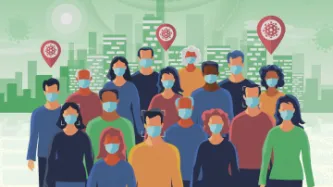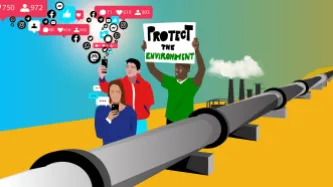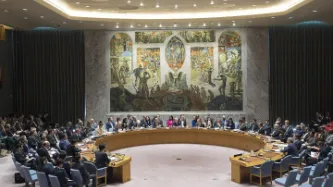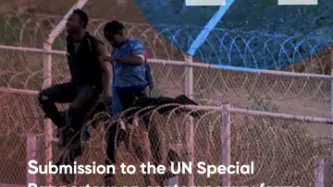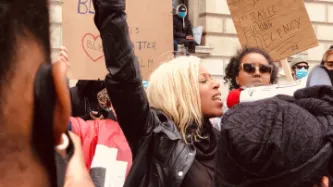Search
Content type: Advocacy
PI welcomes the opportunity to engage once again with the mandate by submitting comments, evidence, and recommendations to the UN Special Rapporteur on the right to health, Ms. Tlaleng Mofokeng. We hope that our input will contribute to the forthcoming report, “Digital innovation, technologies and the right to health”.
Technology has contributed significantly to the planning and delivery of health information, services and care. We have seen the use of data and technology across the healthcare…
Content type: Report
In the months following the beginning of the Covid-19 pandemic, more than half the world’s countries enacted emergency measures. With these measures came an increase in executive powers, a suspension of the rule of law, and an upsurge in security protocols – with subsequent impacts on fundamental human rights. Within this broader context, we have seen a rapid and unprecedented scaling up of governments’ use of technologies to enable widespread surveillance. Surveillance technologies exacerbated…
Content type: Long Read
The defense and protection of the environment continues to come at a high cost for activists and human rights defenders. In 2021, the murders of environment and land defenders hit a record high. This year, a report by Global Witness found that more than 1,700 environmental activists have been murdered in the past decade.
While the issue of surveillance of human rights defenders has received attention, evidence of the surveillance of environmental activists keeps mounting, with recent examples…
Content type: Press release
The decision by the EU’s oversight body follows a year-long inquiry prompted by complaints outlining how EU bodies and agencies are cooperating with governments around the world to increase their surveillance powers filed by Privacy International, Access Now, the Border Violence Monitoring Network, Homo Digitalis, International Federation for Human Rights (FIDH), and Sea-Watch.The complainants welcome the decision by the European Ombudsman and call on the Commission to urgently review its…
Content type: Examples
Even though schools are back in session in person, their teachers can still monitor the screens on their school-issued devices via software such as GoGuardian. In a new report from the Center for Democracy and Technology, 89% of teachers say their schools will continue to use student-monitoring software, up from 84% in 2021, raising worries about how the data will be used in a climate increasingly hostile towards abortion and LGBTQ+ issues.
CDT also reports that 44% of teachers say that at…
Content type: Examples
A new report from the education news site The 74 Million finds that in-school digital surveillance programs are flagging LGBTQ+ content as "pornographic". For example, Gaggle, comprehensive monitoring software implemented in the Minneapolis public school system, has led administrators to notify parents that their children's submissions have been flagged, without context, for mentioning suicide, gay, and lesbian. Democratic senators Elizabeth Warren (D-MA), Ed Markey (D-MA), and Richard…
Content type: Advocacy
Today, PI filed a complaint with the Forensic Science Regulator (FSR) in relation to quality and accuracy issues in satellite-enabled Global Positioning System (GPS) tags used for Electronic Monitoring of subjects released from immigration detention (GPS tags). We are concerned there may be systemic failures in relation to the quality of data extracted from tags, processed and interpreted for use in investigations and criminal prosecutions.
The GPS tags are used by the Home Office to…
Content type: Advocacy
Privacy International (PI) welcomes the call of the Special Rapporteur on the human rights of migrants to assess the human rights impact of current and newly established border management measures with the aim of identifying effective ways to prevent human rights violations at international borders, both on land and at sea.
The issues highlighted in the call for submissions are ones that PI has been investigating, reporting and monitoring as part of our campaigns demanding a human rights…
Content type: News & Analysis
In the midst of the atrocious war currently being waged by Russia on Ukraine, on 14 March 2022 Reuters reported that Clearview AI, the infamous online surveillance company, had offered its services to the Ukrainian defense ministry. A day later in an interview for TechCrunch, Ukraine's vice prime minister and minister for Digital Transformation confirmed that the partnership with Clearview AI was "currently in very early development".
Clearview is an online surveillance company that collects…
Content type: Long Read
In a roundtable available on YouTube, co-hosted with Garden Court Chambers, Privacy International brought together immigration law practitioners to discuss how they’ve used privacy and data protection law to seek information or redress for their clients.Index:1. UK Border 20252. Super-complaint and judicial review challenge to data sharing3. Mobile phone seizure and extraction4. Freedom of Information Act requestsThe dystopian future: UK Border 2025To set the scene on how the future may look…
Content type: Advocacy
We wrote to the Home Office as part of our campaign ‘STOP SPYING ON ASYLUM SEEKERS’, opposing the draconian surveillance of asylum seekers taking place through the Aspen Card.
We asked detailed questions about how data collected from Aspen Card usage is used to monitor asylum seekers, and how the Home Office are alerted to any ‘breach of conditions’ of the card.
In their reply, the Home Office told us that:
“The Home Office can be alerted to a breach of conditions by several internal and…
Content type: News & Analysis
In a ruling handed down on 14 October 2021 by the High Court of Kenya in relation to an application filed by Katiba Institute calling for a halt to the rollout of the Huduma card in the absence of a data impact assessment, the Kenyan High Court found that the Data Protection Act applied retrospectively.
Background to the case
Huduma Namba as initially proposed
In January 2019, the Kenyan Statute Law (Miscellaneous Amendment) Act No. 18 of 2018 came into effect, introducing a raft of amendments…
Content type: Long Read
All around the world people rely on state support in order to survive. From healthcare, to benefits for unemployment or disability or pensions, at any stage of life we may need to turn to the state for some help. And tech companies have realised there is a profit to be made.
This is why they have been selling a narrative that relying on technology can improve access to and delivery of social benefits. The issue is that governments have been buying it. This narrative comes along with a…
Content type: Examples
Human rights experts have accused the home secretary, Priti Patel, of ignoring legal guidance in an attempt to target child asylum seekers who cannot prove they are under 18.
A letter from the Home Office, seen by the Observer, reveals that the government is putting pressure on social workers to speed up the age assessment of unaccompanied minors, and offering to bankroll councils that face legal challenges as a result. The move comes as new evidence shows that hundreds of people were deported…
Content type: Examples
Around 8,800 children have been deported from the United States along the Mexican border thanks to a new pandemic-related measure that functionally stripped the rights of those seeking asylum.
Donald Trump’s administration has expelled nearly 160,000 people since the emergency order proclaimed by the CDC took effect in March including roughly 7,600 adults and children who came to the US in families. The emergency order temporarily suspends citizens, regardless of their country of origin, from…
Content type: Examples
In London, during the UK’s coronavirus lockdown, young black men were stopped and searched by police 21,950 times with no further action taken in 80% of cases. If each individual were searched only once - which may not be the case - that would equate to 30% of all young black males in London. The Metropolitan police increased its use of stop and search during the lockdown, carrying out 43,000 stops in May 2020, more than double the number in May 2019. The Met responded that crime is also not…
Content type: News & Analysis
In the last few weeks, the UK government has announced various new measures to ensure that crossings across the Channel were “inviable” including by appointing a new role of “clandestine Channel threat commander" and further plans to deploy the navy to stop migrants from crossing to the UK from France across the Channel. Premature plans it seems, as not only would such measures be contrary to the UK’s international obligations to allow individuals to seek asylum in the UK, but also since such…
Content type: Case Study
Numerous sexist, mysoginistic, homophobic and racist practices are flourishing online, in ways that are harder for national authorities to stop than when abuse takes place offline. One of these practices is ‘revenge pornography’, which involves online distribution of private sexual images without the consent of the person depicted.
One victim of image based sexual abuse (more commonly known as revenge porn): Chrissy Chambers. Chrissy was 18 years old when her boyfriend convinced her to spend…
Content type: Explainer
At first glance, infrared temperature checks would appear to provide much-needed reassurance for people concerned about their own health, as well as that of loved ones and colleagues, as the lockdown is lifted. More people are beginning to travel, and are re-entering offices, airports, and other contained public and private spaces. Thermal imaging cameras are presented as an effective way to detect if someone has one of the symptoms of the coronavirus - a temperature.
However, there is little…
Content type: News & Analysis
The UN Special Rapporteur on the promotion and protection of human rights and fundamental freedoms while countering terrorism, Professor Fionnuala Ní Aoláin together with Dr. Krisztina Huszti-Orbán, released today a key report on the “Use of Biometric Data to Identify Terrorists: Best Practice or Risky Business?”.
The report explores the human rights risks involved in the deployment of biometrics emphasising that
in the absence of robust rights protections which are institutionally embedded…
Content type: Explainer
Definition
An immunity passport (also known as a 'risk-free certificate' or 'immunity certificate') is a credential given to a person who is assumed to be immune from COVID-19 and so protected against re-infection. This 'passport' would give them rights and privileges that other members of the community do not have such as to work or travel.
For Covid-19 this requires a process through which people are reliably tested for immunity and there is a secure process of issuing a document or other…
Content type: Examples
Gypsy and Traveller communities in England, especially those living on canals and waterways or in unauthorised roadside encampments, have had no access to sanitation, refuse collection, or water for drinking, cooking, showering, and washing clothes during the coronavirus lockdown. Some local authorities have directed Travellers to public toilets without hand-washing facilities, while others tried to evict them. In addition, conditions like COPD and asthma are more common in Gypsy and Traveller…
Content type: Examples
Data-driven companies like Experian, CACI, and Xantura are pitching their services to help UK local officials to identify people in need. Xantura and CIPFA, the accountancy body for the public sector, have teamed up to deploy a £15,000 tool that uses local authority data including the NHS’s “shielded” list of individuals at extra risk from COVID-19 and other risk factors and demographic data to predict future needs for financial support and social care and assign risk for not only an individual…
Content type: Long Read
Over the last two decades we have seen an array of digital technologies being deployed in the context of border controls and immigration enforcement, with surveillance practices and data-driven immigration policies routinely leading to discriminatory treatment of people and undermining peoples’ dignity.And yet this is happening with little public scrutiny, often in a regulatory or legal void and without understanding and consideration to the impact on migrant communities at the border and…
Content type: Examples
Greece has extended a coronavirus lockdown on its migrant camps for the fifth time. The move has prompted accusations that the government is using the pandemic to limit the migrants' movement.
The Greek Migration Ministry announced on Saturday that the country's migrant camps would remain under lockdown until at least July 19. The restrictions began over 100 days ago, on March 21.
"By a joint decision of the Ministers of Civil Protection, Health and Immigration and Asylum, the measures to…
Content type: Case Study
Chinese artist Ai Weiwei creates art that highlights the harmful effects of surveillance on society — and is himself a target of persistent surveillance by the Chinese government. In an article for Agence France-Presse, he said, "In my life, there is so much surveillance and monitoring -- my phone, my computer ... Our office has been searched, I have been searched, every day I am being followed, there are surveillance cameras in front of my house.”
Weiwei is an artist, blogger, documentary…
Content type: Advocacy
Privacy International (PI), Fundaciòn Datos Protegidos, Red en Defensa de los Derechos Digitales (R3D) and Statewatch responded to the call for submission of the UN Special Rapporteur on contemporary forms of racism, xenophobia and related intolerance on how digital technologies deployed in the context of border enforcement and administration reproduce, reinforce, and compound racial discrimination.
This submission provides information on specific digital technologies in service of border…
Content type: News & Analysis
For the past few weeks, people across the world, starting in the US, have taken to the streets to protest the murder of George Floyd, a victim of police brutality. The protests, which are organised by and in support of the Black Lives Matter movement have also become a platform to protest against state sponsored violence and systematic racism against black people.
The majority of articles and media focus have so far focused on what happens during the protest, namely an increasingly militarised…
Content type: News & Analysis
Yesterday, Amazon announced that they will be putting a one-year suspension on sales of its facial recognition software Rekognition to law enforcement. While Amazon’s move should be welcomed as a step towards sanctioning company opportunism at the expense of our fundamental freedoms, there is still a lot to be done.
The announcement speaks of just a one-year ban. What is Amazon exactly expecting to change within that one year? Is one year enough to make the technology to not discriminate…

